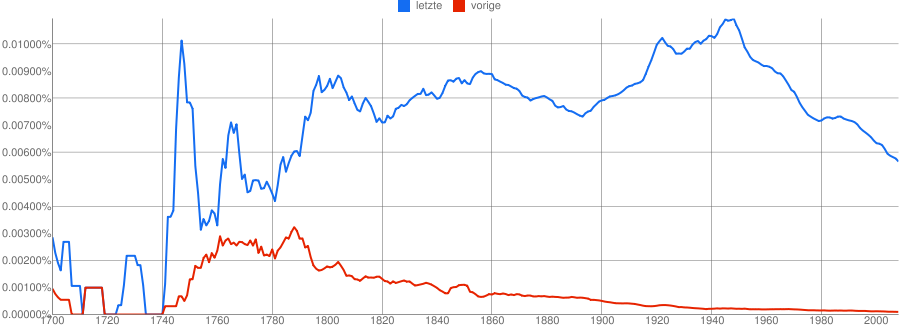Is there any special difference between "das letzte Mal" and "das vorige Mal " when they both mean "the last time"?
3 Answers
They both mean the same: "the last time", but – like in English –
das letzte Mal
can also mean: the very last time of something. For example:
In Hamburg besuchte ich meine Urgroßmutter das letzte Mal vor ihrem Tod.
-
"Das vorige mal" cannot be used in this case? I doubt if there's another word for "the last time" in English, is there?– user508Commented Jul 17, 2011 at 13:49
-
2@Gigili in this special case: no. Das vorige Mal implies that there is or that there will be another time. If the Urgroßmutter has died, (sadly) there will be no next time.– splattneCommented Jul 17, 2011 at 13:53
-
1@splattne: No. There is no such implication. "Das vorige Mal" might be in difference to "Das vorvorige Mal" or another, more early case. "Beim vorvorigen Mal, dass Deutschland Fußballweltmeister wurde, war Beckenbauer Kapitän der Mannschaft, beim vorigen Mal Trainer". There might be another titel, but it isn't implied. Commented Jul 17, 2011 at 21:46
-
@user508 Two alternatives in English: "on the previous occasion" versus "the final time". The both mean "the last time", but I think you can see the difference. Commented Jan 28, 2015 at 11:14
Duden lists both attributes, "vorige", and "letzte" as synonyms for something that recently happened.
However in modern German "letzte" is used far more often. The usage of "vorige" declines:

As there is no general difference in the meaning there may be variations in regional usage. "Vorige" may be considered slightly more distinguished.
My understanding is that "das Vorige Mal" means the PREVIOUS time. It could mean the "last" time in a sequence of earlier events.
Das Letzte Mal LITERALLY means the LAST time. If the "previous" time will actually be the "last" or "final" time, then the two are equivalent.
But suppose an event is supposed to happen five times, and the most recent one was the fourth. Then the FIFTH event would be das LETZTE mal, not Das "VORIGE" (or the fourth).
There is even a threat: The next time you do X will be the LAST time. (Meaning I'll kill, or incapacitate you if you do x.) Here, letzte seems more appropriate than vorige.
